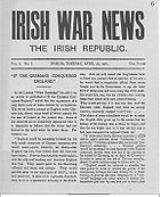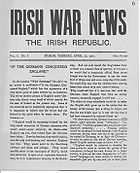
Hibernian Rifles
Encyclopedia

Irish nationalism
Irish nationalism manifests itself in political and social movements and in sentiment inspired by a love for Irish culture, language and history, and as a sense of pride in Ireland and in the Irish people...
militia
Militia
The term militia is commonly used today to refer to a military force composed of ordinary citizens to provide defense, emergency law enforcement, or paramilitary service, in times of emergency without being paid a regular salary or committed to a fixed term of service. It is a polyseme with...
that organised in Ireland in the early years of the 20th Century, having its Dublin Headquarters at 28, North Frederick Street. Its membership was exclusively Roman Catholic.
The Hibernian Rifles were active in Dublin during the Easter Rising
Easter Rising
The Easter Rising was an insurrection staged in Ireland during Easter Week, 1916. The Rising was mounted by Irish republicans with the aims of ending British rule in Ireland and establishing the Irish Republic at a time when the British Empire was heavily engaged in the First World War...
of 1916. In an article in the Irish War News, Patrick Pearse
Patrick Pearse
Patrick Henry Pearse was an Irish teacher, barrister, poet, writer, nationalist and political activist who was one of the leaders of the Easter Rising in 1916...
thanked the Hibernian Rifles for its contribution.
Origins
The Hibernian Rifles was the product of a split in the Ancient Order of HiberniansAncient Order of Hibernians
The Ancient Order of Hibernians is an Irish Catholic fraternal organization. Members must be Catholic and either Irish born or of Irish descent. Its largest membership is now in the United States, where it was founded in New York City in 1836...
(AOH); it was the military arm of the Ancient Order of Hibernians (Irish-American Alliance), which had broken away from Ancient Order of Hibernians (Board of Erin) in about 1907. As the name suggests, most of the former were in the USA where they were under the influence of Clan-na-Gael. The AOH (Irish-American Alliance) claimed to be opposed to "the narrow sectarianism" of the AOH (Board of Erin). However, hostility towards 'Orangeism'
Orange Institution
The Orange Institution is a Protestant fraternal organisation based mainly in Northern Ireland and Scotland, though it has lodges throughout the Commonwealth and United States. The Institution was founded in 1796 near the village of Loughgall in County Armagh, Ireland...
and Antisemitic rhetoric were regular features of The Hibernian. In a characteristic lecture, "Treason in Ireland", the Rifles commandant J. Scollan said: "Many more of us through God’s grace shall live to see the Union Jack of England
England
England is a country that is part of the United Kingdom. It shares land borders with Scotland to the north and Wales to the west; the Irish Sea is to the north west, the Celtic Sea to the south west, with the North Sea to the east and the English Channel to the south separating it from continental...
down in the dust and our own immortal green interwoven with the yellow and white of the Irish Republic waving proudly and victoriously…over the land."
Activities in Ireland
During the 1913 Dublin LockoutDublin Lockout
The Dublin Lock-out was a major industrial dispute between approximately 20,000 workers and 300 employers which took place in Ireland's capital city of Dublin. The dispute lasted from 26 August 1913 to 18 January 1914, and is often viewed as the most severe and significant industrial dispute in...
, a special subscription was placed on the Rifles members in Ireland and a fund was also opened in the USA for the relief of distress of those affected by the strike. The Hibernian Rifles developed friendly relations with the Irish Citizen Army
Irish Citizen Army
The Irish Citizen Army , or ICA, was a small group of trained trade union volunteers established in Dublin for the defence of worker’s demonstrations from the police. It was formed by James Larkin and Jack White. Other prominent members included James Connolly, Seán O'Casey, Constance Markievicz,...
after it was founded by James Connolly
James Connolly
James Connolly was an Irish republican and socialist leader. He was born in the Cowgate area of Edinburgh, Scotland, to Irish immigrant parents and spoke with a Scottish accent throughout his life. He left school for working life at the age of 11, but became one of the leading Marxist theorists of...
, and some members of the former joined the latter, a fact which was advertised regularly in The Irish Worker.
While it was willing to co-operate with other nationalist groups, the Irish Republican Brotherhood
Irish Republican Brotherhood
The Irish Republican Brotherhood was a secret oath-bound fraternal organisation dedicated to the establishment of an "independent democratic republic" in Ireland during the second half of the 19th century and the start of the 20th century...
(IRB) does not seem to have trusted it completely and therefore it had to obtain some of their rifles from James Connolly
James Connolly
James Connolly was an Irish republican and socialist leader. He was born in the Cowgate area of Edinburgh, Scotland, to Irish immigrant parents and spoke with a Scottish accent throughout his life. He left school for working life at the age of 11, but became one of the leading Marxist theorists of...
, and others which they bought from British soldiers.
The Irish Volunteers
Irish Volunteers
The Irish Volunteers was a military organisation established in 1913 by Irish nationalists. It was ostensibly formed in response to the formation of the Ulster Volunteers in 1912, and its declared primary aim was "to secure and maintain the rights and liberties common to the whole people of Ireland"...
declined to affiliate the Rifles as a unit (it also declined the Irish Citizen Army the same status) but friendly co-operation became possible, mainly through Thomas MacDonagh
Thomas MacDonagh
Thomas MacDonagh was an Irish nationalist, poet, playwright, and a leader of the 1916 Easter Rising.-Early life:MacDonagh was born in Cloughjordan, County Tipperary...
. It was through him, perhaps, that they participated as a unit at the funeral of Jeremiah O'Donovan Rossa
Jeremiah O'Donovan Rossa
Jeremiah O'Donovan Rossa , was an Irish Fenian leader and prominent member of the Irish Republican Brotherhood. His life as an Irish Fenian is well documented but he is perhaps known best in death for the graveside oration given at his funeral by Pádraig Pearse.-Life in Ireland:He was born at...
and that they allowed their headquarters, at 28 North Frederick Street, to be used by the Volunteers.
In 1915 it launched a weekly newspaper The Hibernian. The constitutional nationalists
United Irish League
The United Irish League was a nationalist political party in Ireland, launched 23 January 1898 with the motto "The Land for the People" . Its objective to be achieved through agrarian agitation and land reform, compelling larger grazier farmers to surrender their lands for redistribution amongst...
of the time, led by John Redmond
John Redmond
John Edward Redmond was an Irish nationalist politician, barrister, MP in the House of Commons of the United Kingdom of Great Britain and Ireland and leader of the Irish Parliamentary Party from 1900 to 1918...
, scornfully called the advanced nationalist papers "the mosquito press". The Hibernian serialised "Ireland’s Roll of Honour", which was a list of those killed or wounded at Harrel’s ‘Battle of Clontarf
Clontarf
Clontarf may refer to:Placenames:*Clontarf, Dublin, Ireland*Clontarf, New South Wales, Australia*Clontarf, Queensland, Australia*Clontarf, Minnesota, United StatesOther:*Battle of Clontarf, 1014...
’ and Bachelor’s Walk in 1914, or who were imprisoned, deported or served with exclusion orders under the Defence of the Realm Act. According to Pat McGlynn, "It was one of the most aggressive pieces of journalism of the period and one that deserves more attention than it has received".
The Easter Rising
Co-operation between the Rifles with the Volunteers increased, as the Rising began to draw near, but no definite date for the insurrection was given to it by the leaders of the IRB. On Easter Sunday, 1916, it paraded as usual at its headquarters. When news of Eoin MacNeillEoin MacNeill
Eoin MacNeill was an Irish scholar, nationalist, revolutionary and politician. MacNeill is regarded as the father of the modern study of early Irish medieval history. He was a co-founder of the Gaelic League, to preserve Irish language and culture, going on to establish the Irish Volunteers...
’s countermanding order canceling the planned Volunteers manoeuvres, which were to be the signal for the Rising, appeared in the Sunday Independent
Sunday Independent
The Sunday Independent is a broadsheet Sunday newspaper published in Ireland by Independent News and Media plc. The newspaper is edited by Aengus Fanning, and is the biggest selling Irish Sunday newspaper by a large margin ; average circulation of 291,323 between June 2004 and January 2005,...
, the commandant, realising that something serious was planned, ordered the Rifles to parade the next day.
The Easter Rising began at 12 noon on Easter Monday. The men of the Hibernian Rifles were given a choice whether or not to take part, and 20 to 30 chose to participate and went to the General Post Office
General Post Office (Dublin)
The General Post Office ' in Dublin is the headquarters of the Irish postal service, An Post, and Dublin's principal post office...
at midnight. On the Tuesday some of them, along with men from Maynooth
Maynooth
Maynooth is a town in north County Kildare, Ireland. It is home to a branch of the National University of Ireland, a Papal University and Ireland's main Roman Catholic seminary, St. Patrick's College...
, were sent to the Exchange Hotel in Parliament Street
Parliament Street
Parliament Street is the name of several places including:*Parliament Street, Exeter, one of the world's narrowest streets in Exeter, England...
, where, in a rapid exchange of fire, one of their rank was fatally wounded, before retiring back to the GPO where they remained for the rest of the week.
Pat McGlynn, in his conclusion to his chapter on the Hibernian Rifles, says of them that although "small in number, the Hibernian Rifles should not be forgotten in any celebration of the Rising that was not of their planning, but in which they willingly joined when once it had begun".
External links
- History of the Hibernian Rifles, Ancient Order of Hibernians, Division Seven (Our Lady of Knock), accessed 22 December 2007.

